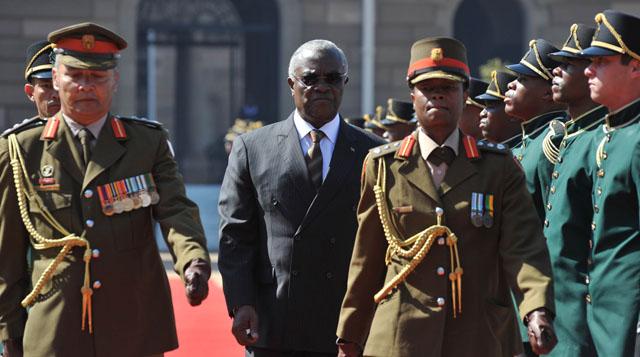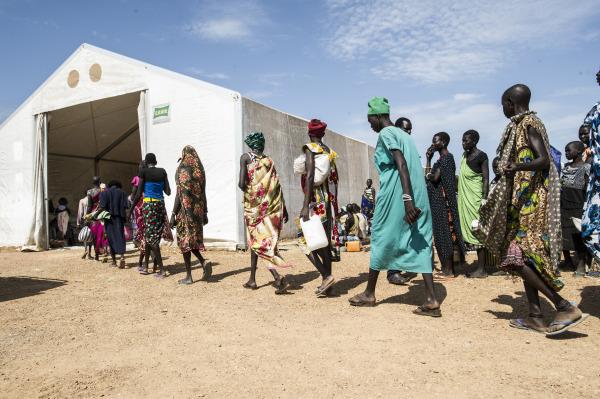Everything you need to know about São Tomé and Príncipe’s presidential elections

Voters go to the ballots this Sunday. Can the incumbent hold on to the presidency?

How will Manuel Pinto Da Costa fare in the upcoming vote? Credit: GCIS.
On 17 July, the small island nation of São Tomé and Príncipe, a former Portuguese plantation colony located in the Gulf of Guinea, will hold presidential elections.
Up to 111,222 registered voters will go to the polls, which will see incumbent Manuel Pinto da Costa, in power since 2011, face off against a host of contenders.
Under São Tomé and Príncipe’s semi-presidential system, what is at stake is not the position of head of government, which is held by the prime minister, but the role of a head of state, which primarily deals with representative and monitoring functions.
This was not always the case. Up to ten years ago, the division of power between the president and prime minister was much more ambiguous, and turf wars often emerged between the two leaders. For instance, President Miguel Trovoada (1991-2001) dismissed two prime ministers in his time, while his successor, President Fradique de Menezes (2001-2011) dismissed three.
In 2006, however, constitutional changes reduced the presidency’s executive powers in the areas of defence and foreign affairs and made it harder for the head of state to dismiss the PM and dissolve the 55-member National Assembly.
These changes enabled more political stability. For example, in the 15 years from 1991 to 2006, there had been 13 different governments – a situation that was not helped by a series of weak coalition governments. But in the next eight years from 2006 to 2014, there were just four.
Since 2014, the government has been led by Prime Minister Patrice Trovoada, the son of former president Miguel. Patrice Trovoada has been PM twice before, but both times was dismissed by a motion of no confidence in parliament – once in 2008 and again in 2012.
He came to power again, however, in the 2014 elections when his Acção Democrática Independente (ADI) party won a surprise absolute majority in the National Assembly, securing 33 of the 55 seats.
In his previous stints, Trovoada was in charge of either a coalition or minority government, but now with an absolute majority in place, his government looks set to become the first since 1991 to reach the end of the its four-year term.
Meet the contenders
In terms of the main competitors, this Sunday’s elections are largely a repeat of 2011, and will see President Manuel Pinto da Costa come up against Evaristo Carvalho and Maria das Neves.
Pinto da Costa, 78, was the country’s first president under socialist one-party rule from 1975 to 1991 and is a former leader of the Movimento de Libertação de São Tomé e Príncipe (MLSTP).
As the nation’s first president, Pinto da Costa appointed Miguel Trovoada as his prime minister and the two worked together closely until they fell out around 1979. Trovoada was demoted to Minister of Economy and was later accused of planning a coup. He was detained without charge until 1981 when he went into exile in France. Since Trovoada returned in 1990, the two former allies have been able to maintain a working relationship whenever necessary, though the past has not been forgotten – by either Miguel or his son and PM Patrice.
Pinto da Costa twice ran for president unsuccessfully – losing to Miguel Trovoada in 1996 and to Fradique de Menezes in 2001 – before finally returning to the presidency in 2011.
One of the figures challenging him on Sunday will be Evaristo Carvalho, 74, who was a minister in the late-1970s and has been prime minister twice since 1991. He used to be close to Miguel Trovoada and is considered by some to be a proxy of Patrice Trovoada. He was endorsed by ADI in late May.
Another contender on the ballot paper will be Maria das Neves, 58, an economist at the Central Bank and a long-time parliamentarian with the MLSTP/Partido Social Democrata (the renamed version of the MLSTP), currently São Tomé and Príncipe’s second largest party.
Neves had two stints as economy minister before becoming the country’s first female prime minister in 2002. In 2004, she was dismissed by then President Menezes due to her alleged involvement in a major corruption scandal. She denied wrongdoing and accused Menezes of political motives. She was charged with the embezzlement of public funds, but three years later a judge stopped proceedings due to a lack of evidence.
Her husband, Carlos Quaresma, however, has been convicted of fraud due to his involvement in a $500 million fake treasury bonds scheme in 1999, when Neves was economy minister.
In the 2011 presidential elections, Neves, who ran as an independent, finished fourth. Carvalho reached the run-off where he garnered 47.1%. And Pinto da Costa, also running as an independent won the final round with 52.9%.
One party rule?
Despite some democratic progress and considerable foreign aid, São Tomé and Príncipe has faced disappointing socio-economic development. Around half the population live in poverty, the once crucial cocoa sector has stagnated, hopes of oil discoveries went nowhere, and plans to turn the archipelago into a logistics and services hub never materialised.
However, when it comes to these elections, the choice being presented to voters is not so much between competing political programmes as it is between either continued power-sharing or de facto one-party rule. After all, if Carvalho were elected, Trovoada and the ADI would be in a position where they dominated the presidency, government, parliament and the municipalities.
ADI has superior campaign finances and Carvalho may have an advantage in that his main competitors have roots in the same party whose vote may split. However, despite these factors, his victory is far from guaranteed. Voters may wish to punish ADI at the ballot box for its lack of success in generating the economic growth it promised in 2014. And it is notable that São Tomé and Príncipe’s electorate has always avoided giving both the presidency and the premiership to the same party.
Carvalho has addressed this possibility of ADI dominance on the campaign trail in positive terms, claiming he is the only candidate able to guarantee political stability and cohesion. But this may not necessarily ring true with voters given that since Trovoada’s election as PM in 2014, his relationship with President Pinto da Costa has not been marked by conflict, but rather distance and non-interference.
As well as attempting to capitalise on fears about possible ADI supremacy, Pinto da Costa’s has tried to present himself as the best candidate to bring together different political camps and create the conditions for dialogue between civil society and political structures.
Meanwhile, Neves has centred much of her campaign and appeal on a promise to combat social exclusion and promote national dialogue and reconciliation.
Banho and ballots
Along with campaign promises, elections in São Tomé and Príncipe also typically involve vote-buying, a practice locally known as banho (literally ‘bath’). Local politicians have repeatedly condemned this practice while at the same time using it to their advantage. Many poor people actively ask for money in exchange for their vote.
In the past, this phenomenon has never been considered decisive in the final outcome, especially since all the principal competitors are understood to engage in it. And in this election, the circumstances are unlikely to be different.
This crucial vote in São Tomé and Príncipe could pan out in a number of ways and it remains to be seen how the candidates’ campaigns have resonated with the electorate. However, all things considered, an eventual victory for the incumbent Pinto da Costa is perhaps the most likely scenario. Neves, who represents a younger generation of experienced politicians, also has a decent chance of doing well, especially if the electorate shows itself to be tired of the old political generation and ready for a female head of state.
Either way, it seems unlikely that any of the three principal candidates will win an absolute majority come Sunday. If this is the case, a second round run-off will be held between the two leading nominees on 7 August.
Gerhard Seibert, Universidade da Integração Internacional da Lusofonia Afro-Brasileira (UNILAB), Bahia, Brazil




A really performed case study!
cialis coupon cialis 20mg